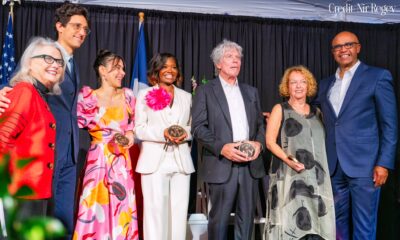Published
4 years agoon
This Fantasia Film Festival interview contains spoilers.
THE NATURAL ARISTOCRAT [NIR REGEV]: I just want to mention I was a huge fan of Orphan when it came out. I still remember seeing it on opening night!
ISABELLE FUHRMAN: Awesome! It was so long ago, so crazy. So crazy.
THE NATURAL ARISTOCRAT: Yeah, it was such a cool movie.
STEFANIE SCOTT: Gotta get ready for Part 2!
ISABELLE FUHRMAN: Yeah, Part 2 is coming out!
THE NATURAL ARISTOCRAT: Yeah, I saw on Deadline you’ll be back as Esther.
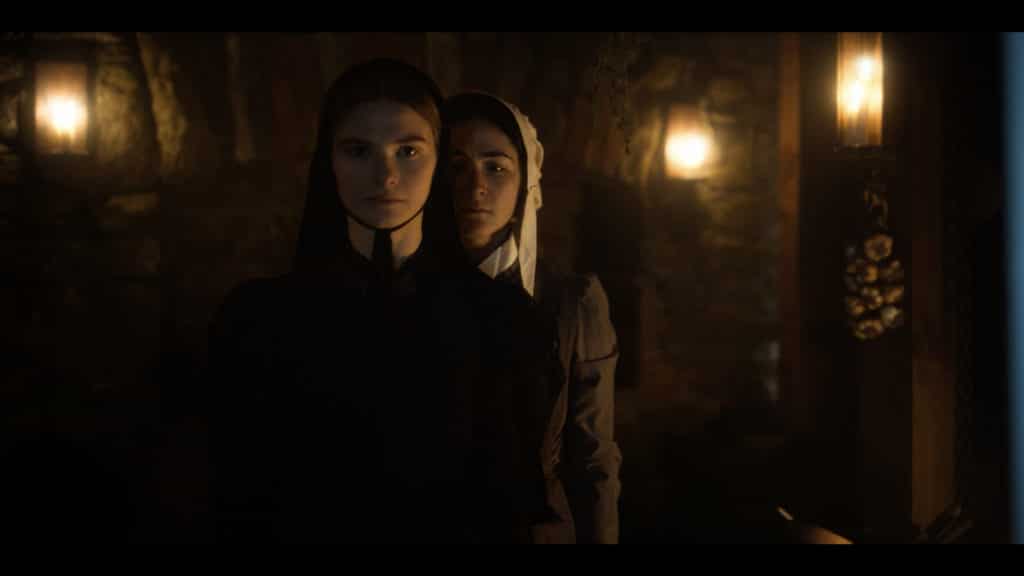
Stefanie Scott as Mary & Isabelle Fuhrman as Eleanor in ‘The Last Thing Mary Saw’
THE NATURAL ARISTOCRAT: I want to start off asking about a part towards the end of the The Last Thing Mary Saw, when the father blames himself for the book Mary read. It goes back to the idea of nature or nurture as he appears to believe he nurtured Mary’s so-called sinful thoughts by the book. But obviously, Mary and Eleanor do not subscribe to that idea.
What are your thoughts on the father’s belief? Whose viewpoint is actually alluding to a much bigger idea if you really think about it.
STEFANIE SCOTT: There’s a lot of really big questions in this movie actually. But, that moment you mentioned, I feel the main part of the movie is silence. That’s kind of what’s killing them is this lack of communication and kind of their take on what God is and how it’s all of these rules. And it has to be a certain way.
I guess he started to question it there and they’re taught not to question things. That’s why we’re always in trouble and being punished.
They kind of go outside the norm or they do question things in, what is God? What is good? Would God create something not good if at all?
There’s a lot of questions in the movie. I guess it was guilt and shame about doing certain kinds of things also tightens the grip even more.
ISABELLE FUHRMAN: I think it’s also when you work to live in an environment where everything’s so structured and rigid… If you have, a kid, for example, like Mary, who starts to kind of bridge out from what the approved norm or narrative and family is, then you try to figure out where that could have come from.
And he blames himself because he almost feels as if he planted that seed inside of her, of curiosity through that book. Which in a sense could be true or could not be true.
I mean, I feel like you kind of come into the story where we’ve already had a relationship. You’re entering as an audience member partway through.
But I always felt like, Eleanor and Mary’s love comes from such a deep place where it’s like, they feel the safest, the most appreciated, the most cared for. The happiest when they’re together. That’s where they feel free.
To them that’s how they define their view on what God is. [Director] Edoardo Vitaletti said he grew up in a very religious family, and he always kind of questioned what is it exactly that we could define as God?
And that to him, God is love. So Mary & Eleanor’s love is an act of God in and of itself, but it’s not necessarily within this world. As Stefanie said, to them God is a set of rules, a set of Tenets you must follow. In a sense, what you believe is your reality.
Two completely different storylines just kind of branch out and that’s what causes the tension that causes this family to fall apart.
THE NATURAL ARISTOCRAT: I thought the use of bread was a really big aspect of The Last Thing Mary Saw because there’s all these references to peasantry basically in the chapters. It’s utilized as a bargaining chip and even in the last scene the family pounces on the bread on the table during dinner. Does that mean despite Mary’s relatively large estate they were still a family of peasants more or less and not of means?
ISABELLE FUHRMAN: I think part of the reason they selected the house that they did was because it was authentic. That house was not built by a company, it was built by people who established that house years and years ago during that time period. And so this family takes a lot of pride in their home and what they have. But at the same time, everything in this house is falling apart on the outside too.
Edoardo [Vitaletti] chose not to like refurbish things in it or fix some of the stuff that was broken. Everything within it, outside of his house is kind of falling apart, but they’re so stuck inside of it. Those luxuries like bread, for example, become this sort of gluttonous thing that they get to share in.
Something that they very rarely allow themselves to do because it goes against what they believe is the right way to act. So pride is the theme. I don’t think Eleanor has any sort of pride, she’s had that completely stripped out, especially by the end.
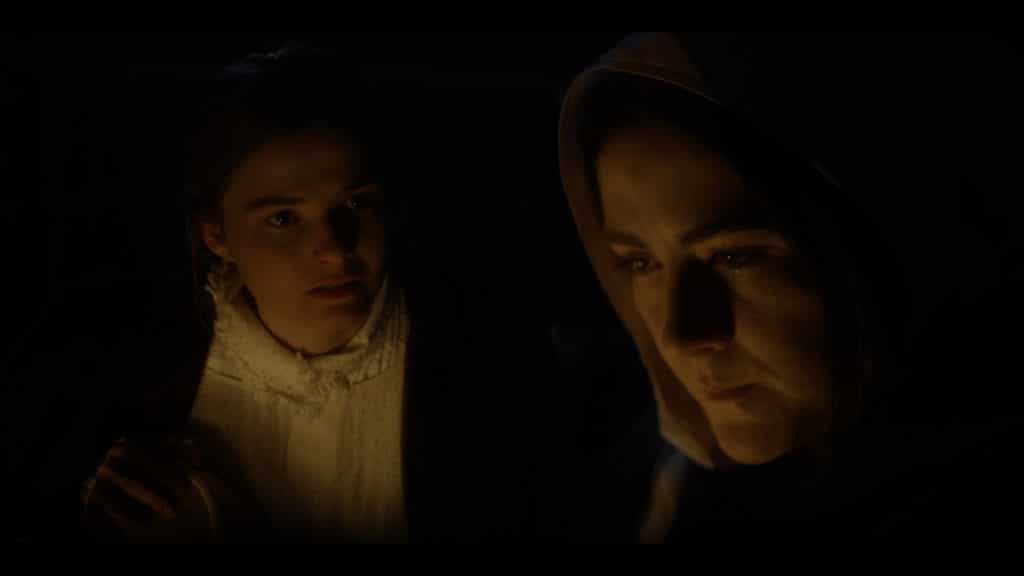
Stefanie Scott as Mary & Isabelle Fuhrman as Eleanor in ‘The Last Thing Mary Saw’
I think it’s Mary’s plan to give Eleanor hope that she’ll be able to get that pride back for herself. I think that it’s really horrible to live in those conditions. You just work constantly and it’s not anything easy.
Everything takes time. Washing clothes, baking bread, it all takes time because everything has to be done to their liking and their specific needs. Eleanor is just there for the family, essentially.
THE NATURAL ARISTOCRAT: There was a subtle detail I liked where Mary seems like she’s about to go for a kiss right at the beginning of The Last Thing Mary Saw… But then she places her head down on Eleanor’s shoulder instead. I was wondering if that was improvised because it’s such a gentle, subtle physical action? Or was it always written that way in the script?
STEFANIE SCOTT: It was in the script. But everything in the movie is very subtle and intentional. I think that’s just Edoardo [Vitaletti] really having such an amazing vision & knowing every moment counts and means something. It was totally planned by him.
ISABELLE FUHRMAN: It’s also easy just to have a kiss. I feel like their love is so tender and beautiful and almost like careful because they never kissed anybody before. That was something we talked about too, that kissing in the chicken coop is probably the first time that they’ve ever done that.
THE NATURAL ARISTOCRAT: Was the rice torture based on something real where they put their knees on rice? I’ve never really seen a torture like that before this film.
STEFANIE SCOTT: It’s a real punishment that people went through. I mean, thank goodness, not anymore, but I know that people grew up in orphanages…
THE NATURAL ARISTOCRAT: That whole chicken coop scene… I have to ask did you have fun interacting with all the chickens, Isabelle?
ISABELLE FUHRMAN: It was smelly for sure. I love animals! See, the thing is I loved the live chickens. (laughs) I was so happy to get in there and like do my chicken impression and hang out with them.
THE NATURAL ARISTOCRAT: Yeah, I saw you petted one of the chickens in the film.
ISABELLE FUHRMAN: Yeah, I love animals! I mean, I had such a great time with the chickens. It was when we had the dead chickens.
That was when it was horrible because they smelled because they had to be boiled. So that way I can pluck them. I mean, they put something I think on them. So that way they could last for the whole day.
We couldn’t have them semi cooked wrong. It was so gross. So I like the live chicken. I was like, totally there for that. Those were fun, fun times.
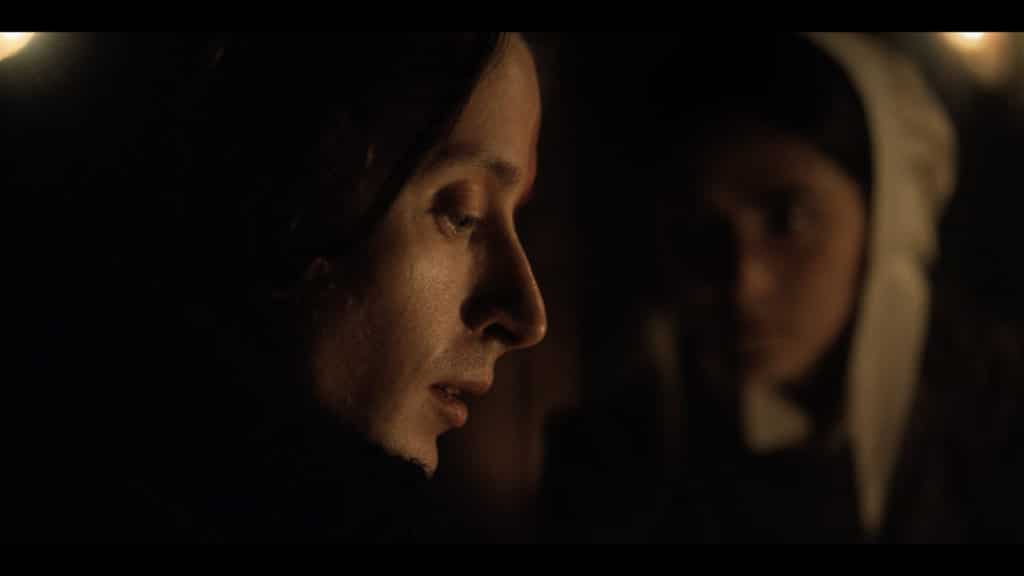
Rory Culkin as The Intruder and Isabelle Fuhrman as Eleanor in ‘The Last Thing Mary Saw’
THE NATURAL ARISTOCRAT: What was it like shooting the scene in the kitchen with Rory Culkin? For me, I think it’s one of the strongest scenes in the movie. Especially because he has that speech about how they wanted to burn his face with a candle. At first you feel he’s a sympathetic character like them, another tortured soul… Until the whole thing reverse on Eleanor.
ISABELLE FUHRMAN: I feel just because you think you can identify with somebody, it doesn’t necessarily mean that they’re on your side or that they have your back. Everybody has their own intentions and their own kind of goals in their life… And their own thing that they’re dealing with.
When Rory came in, he only worked for a day, he came in just to do that scene. The scenes that he had in his element, we didn’t have much time to talk about it, but he’s such a fantastic actor and had such a cool idea of what he wants to do with that scene. We just sat down and kind of hashed it out with Edoardo [Vitaletti].
There was such a great back and forth between them. It’s interesting like you said that this person comes in and maybe that they can connect. Maybe he understands where she is, where she and Mary are, but it diverges very quickly.
I think that there’s something to be said about who you put your trust in and why you trust certain people. We’re not all good and we’re not all bad. We’re just human. At the end of the day.
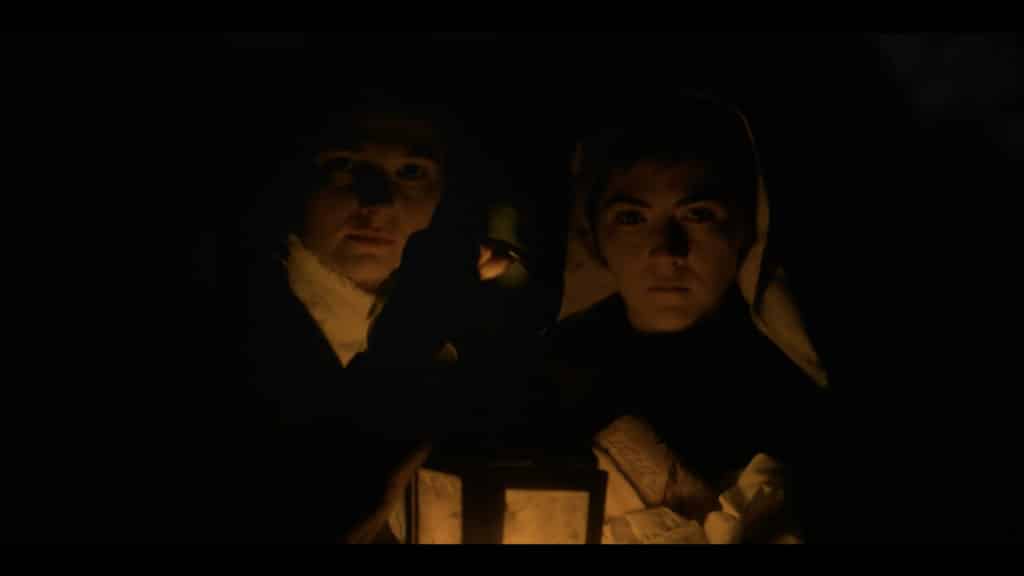
On right – Isabelle Fuhrman as Eleanor in ‘The Last Thing Mary Saw’
THE NATURAL ARISTOCRAT: This is a spoiler. I was really surprised Mary let her brother drink the tea. As an audience, I think there’s a natural inclination to believe Mary wouldn’t go through with it and yell “Don’t drink it!” at the last second.
But she does let it happen! What are your thoughts on that Stefanie?
STEFANIE SCOTT: I know it’s a really big moment. It’s intense, she has a plan and she follows through with it. It shows not all people are all good or bad. It’s a big mix and all these people are projecting their pain onto others.
Mary’s parents put Eleanor and her through hell. When they’re the ones who are preaching about God and heaven. It’s interesting, she lets it happen. I think a lot of people, we don’t know why they do certain things.
In that moment she freezes up and she can’t do anything about it.
But it’s also what are you willing to do for what you want or what you need? You’re almost faced with this like question where it is a split second decision of, ‘Do I save my brother?’
Do I save myself? That’s what I loved about the film. The beauty of the writing in this movie is that you really kind of dance between what you think about these people. I mean, I feel you have a general idea of the family.
There’s something off in this family and you really are rooting for Eleanor and Mary, but at the same time, we’re not all good.
THE NATURAL ARISTOCRAT: What made you want to take these roles when you initially picked up and read the script? What jumped out at you most?
STEFANIE SCOTT: The script was awesome. I mean, the whole story is completely planned and thought out. I was so impressed by the script and when I met Edoardo [Vitaletti], his vision was epic and I really felt like I connected with him.
I wanted to work with him and that’s really as simple as it was for me. He was awesome. The script was awesome and I knew he was going to do something amazing with it and had such an amazing future ahead of him. So I wanted to be part of that.
ISABELLE FUHRMAN: I got an email and they told me Stefanie was going to be in the movie and I wanted to work with Stefanie again! Cause I love her.
THE NATURAL ARISTOCRAT: BFFs?
ISABELLE FUHRMAN: Yeah! (laughs) I read the script and I talked to Edoardo and I was really floored by his vision. You know, when you’re selecting what kind of projects you want to work on, making movies, it’s a lot like dating.
You have an idea and you hope that the person you meet has the same idea. So it’s really cool when you connect & click and you’re like, ‘Okay, we both want to make the same story. We want to tell it the same way!’ It was a super easy decision.
I also loved the idea of doing a movie where I didn’t speak for much of that. I mean, that’s a really cool challenge as an actor to just be able to be present with someone is talented as Stefanie. To show up every day and really live in that space.
I had never done that before. It’s rare to read a script for somebody who doesn’t speak very much and silence was such a huge theme in the whole story and script. The silence of the family, not being able to communicate with each other in silence in this world.
The quiet silence of like the time period as it is. Then the silence that these girls are kind of forced to have about their relationship and about how much they love each other because of where they are. Eleanor literally has her voice taken from her.
THE NATURAL ARISTOCRAT: How did it feel to adapt to essentially playing someone who’s mute as an actress? It seemed like you’d become as vulnerable as humanly possible at that point. Particularly, when you’re crying in the dining room as the family eats.
ISABELLE FUHRMAN: It’s a really vulnerable place to be. It’s a really strange thing to be kneeling on rice around an entire room full of people in like your undergarments. Those were some of the scenes that we had to film, but that just kind of added to the horror that these girls are going through.
And like what Stefanie just said… This family is creating hell for these young women on Earth in order to hopefully save them from hell in the afterlife so they can go to heaven. It is an interesting switch to play out where it’s like, they could just not create this horrible environment for them while they’re living in this world.
Let God take care of the rest. But it is really what people believe in and how they will force their beliefs on others sometimes.
THE NATURAL ARISTOCRAT: Thank you!
ISABELLE FUHRMAN & STEFANIE SCOTT: Thank you!
– Learn more about Director Edoardo Vitaletti’s film The Last Thing Mary Saw at Fantasia International Film Festival.
Fun Fact: Yes, actor Rory Culkin is the younger brother of Macaulay Culkin!
– Love independent films? Be sure to watch our Fantasia interview with Zita Bai, Vas Provatakis, Qiyu Zhou on ‘Baby, Don’t Cry’
– Looking for insight into the dark side of making it in a creative field? Check out our Fantasia interview with Dreams on Fire Director Director Philippe McKie.
– Speaking of Dreams on Fire, read our exclusive interview with Bambi Naka on her feature debut!
Nir Regev is the founder of The Natural Aristocrat. You can directly contact him at [email protected] for coverage consideration, interview opportunities, or general comments.

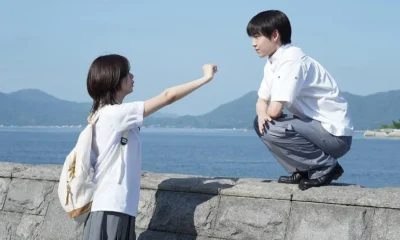

‘Rewrite’ Movie Review: Our Fantasia 2025 Top Pick
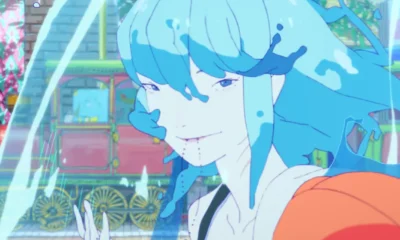

ChaO (2025) Anime Movie Review | Fantasia Festival


The Last Woman on Earth (2025) Movie Review | Fantasia Fest
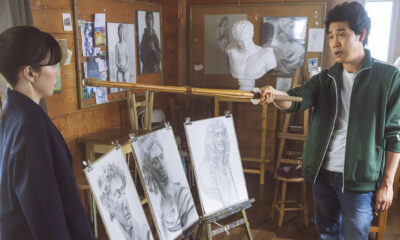

5 Movies to look forward to at Fantasia Film Festival 2025
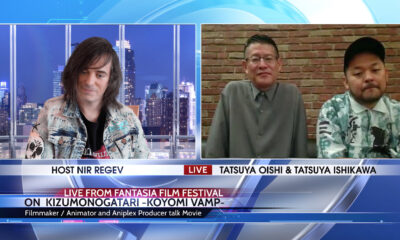

Fantasia 2024 Interview: KIZUMONOGATARI -Koyomi Vamp- Director, Producer (Video)
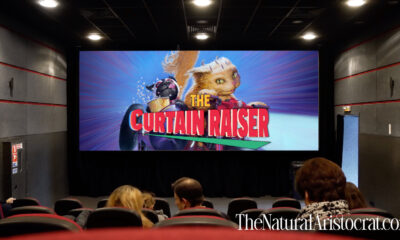

5 Movies to Watch at the 2024 Fantasia Film Festival
The Natural Aristocrat






